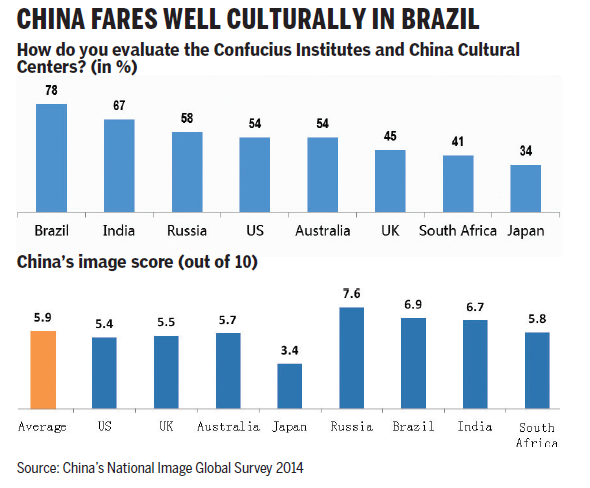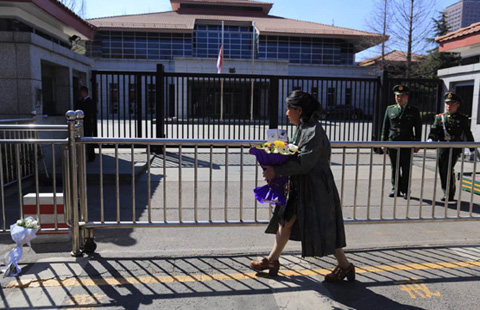China finds acceptance in LatAm
Updated: 2015-03-23 03:54
By Zheng Xin in Beijing(China Daily Latin America)
|
||||||||
Confucius Institutes, centers of Chinese culture are well received
The Confucius Institutes and China cultural centers enjoy a high reputation in Brazil and other parts of Latin America, despite global low public awareness, according to a report.
As many as 78 percent of the interviewees from Brazil positively evaluate the Confucius Institutes and China cultural centers, followed by India at 67 percent, Russia at 58 percent, the US and Australia at 54 percent, according to China's National Image Global Survey 2014 released in Beijing on March 18.
The report said those in Japan, South Africa and the UK gave the lowest ratings, it said.
Some 24 percent are aware of the Confucius Institutes worldwide, of which 57 percent approve of the establishment of the institutes and China cultural centers in their countries.
The language teaching organization affiliated with secondary schools has become a useful tool for people across the world to understand Chinese culture and history, while increasing mutual understanding, said Yu Yunquan, deputy director with the China International Publishing Group.
"It plays a positive role in spreading Chinese soft power abroad," he said.

The study was conducted from November to December 2014, based on a total of 4,500 respondents from nine countries representing different geographic regions and stages of economic development, including major developed countries — the US, the UK, Australia and Japan — as well as major developing countries, including South Africa, India, Russia, Brazil and China.
The global survey, used online questionnaires to poll local residents between 18 and 65 years old, with the ratio of men to women at 50:50, was conducted by the Center for International Communication Studies of China, Foreign Languages Publishing Administration, Millward Brown and Lightspeed GMI.
Started in 2004, Confucius Institutes are nonprofit Chinese-language and cultural organizations affiliated with China's Ministry of Education. They usually operate at overseas colleges and universities and are now a global phenomenon.
Thanks to the growing ties between China and Latin American countries in recent years, the demand for Chinese-language and culture learning has been surging in the region.
The Confucius Institutes have also witnessed expansion.
The Confucius Institute has built some 39 branches in Latin America since 2006, with its first facility open in Mexico City.
To keep up with the rocket interest in local people's interests in learning Chinese and culture, the Office of Chinese Language Council International, better known as the Hanban, has vowed to make the region one of the priorities in overseas expansion, and has received a positive response in student numbers.
Seven Confucius Institutes have opened in Brazil since 2008, after the first was launched at Sao Paulo State University.
Thiago da Silva, a Brazilian who works with a local energy development company with ties to the Chinese market, and who studied Chinese at the Confucius Institute at Pontifical Catholic University of Rio de Janeiro in 2012, told China Daily earlier that the institute was like a bridge between China and Brazil.
"We had almost no channel to learn what it was like in China before the institute was established," he said.
"Now, people have ready-made curricula and Chinese teachers to learn about the language and culture directly."
According to Hanban, it has established 446 Confucius Institutes and 665 Confucius Classrooms worldwide, with 26 institutes and 10 classrooms in 11 Latin American countries.
Currently there are almost 200 teachers serving in the Confucius Institutes in Latin America.
Considering the lack of adequate teachers being one of the major challenges for the institute's expansion, Hanban said it was considering putting forward various plans to attract more Chinese language teachers with Spanish speaking capacity to join the team.
One of the plans is the provision of scholarships for teachers and students from Latin American countries to learn Chinese language teaching in China, it said.
Hanban has opened the Confucius Institutes Latin American Regional Center last year, the second regional center for the institutes worldwide after the first one was established in Washington in 2013.
In addition to China's cultural image, people in Brazil also give positive evaluation of China's scientific and technological innovation capacity, with 78 percent of the interviewees in Brazil who highly evaluate the capacity, followed by Russia at 90 percent and India at 80 percent.
Against the high evaluations in the developing countries, those developed countries barely find China's Scientific and Technological image positive. The respondents of Japan gave the lowest appraisal of China's scientific and technological innovation capacity, with only 16percent of respondents holding a positive attitude, together with US at 54 percent, Australia at 57 percent and UK at 59 percent.
When it comes to military field, most Brazilians, 34 percent in all, believe China's military strength an important force for maintaining international order. However, there are still 33 percent that believe the country's military poses a threat to the territorial security of other countries.
"Fear of a 'China military threat' still exists in Western countries," said Yu.
As many as 35 percent of the respondents believe China's military poses a threat to the territorial security of other countries.
However, compared to the survey conducted last year, more respondents believe that China's military is an important force for "maintaining international order" and "maintaining world peace", with 28 percent and 17 percent agreeing with the statements, respectively.
The ratings are similar to those from the APEC Economic Leaders' Beijing Meeting, with 82 percent of Brazilians recognizing China's important position in APEC, after 84 percent by Russia and above the average 71 percent.
Most Brazilians are concerned about China's innovation development, economic reform and growth, regional economic integration and comprehensive connectivity, said the report.
On the other hand, only 31 percent of the Japanese respondents, the lowest assessment among all countries, affirmed China's status and role in APEC, after South Africa of 66 percent, India of 74 percent, Australia of 76 percent and UK of 76 percent.
Yu said the better impressions of Brazil, just like the rest of the developing countries included in the survey, in military, cultural and scientific fields, is due to the bilateral relationship between China.
The better the mutual relationship, the better the impression and evaluation, he said.
Dong Guanghua, group account director of Millward Brown, added that Chinese companies' going global strategy mostly in the developing countries in recent years also contributes to the nation's relatively positive image in those regions, compared to their developed counterparts.
"Most respondents from developing countries have a positive attitude towards the Chinese companies doing business there, thinking they would bring new capital and technology, while increasing employment opportunities," he said.
Dong said as more Chinese companies and enterprises go global with their mature business model, the country's national image worldwide is to further improve.
"The only thing that the Chinese companies should pay attention to is to better their product quality and after-sales service, the major obstacles that always hold back foreign customers," he added.
zhengxin@chinadaily.com.cn

 Dramatic changes for Chinese miners in the last 30 years
Dramatic changes for Chinese miners in the last 30 years
 Antitrust policy 'treats all fairly'
Antitrust policy 'treats all fairly'
 Top 10 young Chinese entrepreneurs defining the future
Top 10 young Chinese entrepreneurs defining the future
 Singapore Embassy in Beijing mourns Lee Kuan Yew
Singapore Embassy in Beijing mourns Lee Kuan Yew
 China joins legendary flower show
China joins legendary flower show
 Monks perform tea-picking ritual in Hangzhou
Monks perform tea-picking ritual in Hangzhou
 Singapore founding father Lee Kuan Yew
Singapore founding father Lee Kuan Yew
 5 things you may not know about the Spring Equinox
5 things you may not know about the Spring Equinox
Most Viewed
Editor's Picks

|

|

|

|

|

|
Today's Top News
Kites of Asia soar at Smithsonian
Beijing artist gives back to opera
Lee remembered as 'old friend' of Chinese people
Texas Republican Cruz announces presidential bid
Fictional TV presidents more popular than Obama - poll
Funding of China-backed bank will be open to other countries
Six Western economies apply to join AIIB
US urged to honor pledge
US Weekly

|

|







